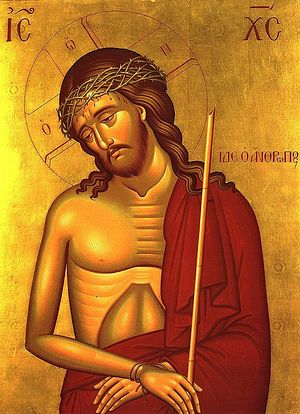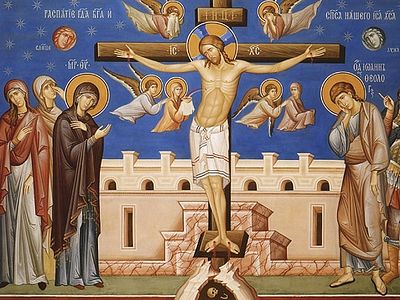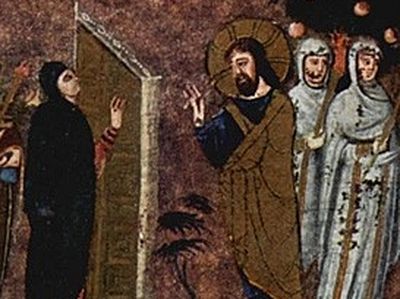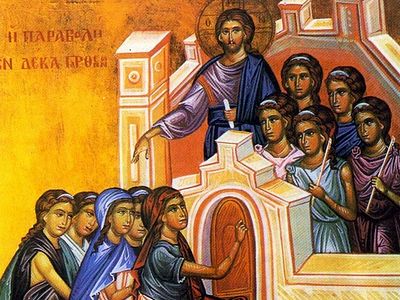Behold, the Bridegroom comes at midnight, and blessed is the servant whom He shall find watching; and again, unworthy is the servant whom He shall find heedless. Beware, therefore, O my soul, do not be weighed down with sleep, lest you be given up to death and lest you be shut out of the Kingdom. But rouse yourself crying: Holy, holy, holy, art Thou, O our God. Through the Theotokos, have mercy on us.
+ Troparion of Bridegroom Matins
The services of the first few days of Orthodox Holy Week have a collective theme of judgment. The centerpiece of those days is the service known as “Bridegroom Matins,” so named for the icon of Christ the Bridegroom (pictured here), an interesting name for Christ depicted in His humiliation, crowned with thorns, robed in derision, with the rod of His chastisement in His hand. It is part of the “upside-down” character of Holy Week. Judgment is clearly one of the most upside-down characteristics of the events that unfold in Christ’s last earthly days.
I was nurtured on stories as a child that contrasted Christ’s “non-judging” (“Jesus, meek and mild”) with Christ the coming Judge (at His dread Second Coming). I was told that His second coming would be very unlike His first. There was a sense that Jesus, meek and mild, was something of a pretender, revealing His true and eternal character only later as the avenging Judge.
This, of course, is both distortion and heresy. The judgment of God is revealed in Holy Week. The crucified Christ is the fullness of the revelation of God. There is no further revelation to be made known, no unveiling of a wrath to come. The crucified Christ is what the wrath of God looks like.
The first three days of Holy Week are collectively known as the End. And it is this End that forms the character of judgment. The end of something always reveals the truth of a thing. As the popular saying has it, “Time will tell.” When the End is the end that is brought by God, then the true end of all things is revealed.
And this is the characteristic of the judgment made manifest in Holy Week. Christ is moving towards His end, the consummation of the Incarnation. As He is increasingly revealed, everything around Him is revealed as well. Things are shown to be more clearly what they are. Those who hate Him, begin to be revealed as plotters and murderers. What was once only thoughts and feelings of envy become plots and perjury. The power of Rome is unmasked for its injustice, mere people-pleasing. The High Priest is revealed to believe that the destruction of God is good for his nation. The weakness of the disciples and the empty boasting of Peter and the rest are shown for their true emptiness. The sin of the world is revealed in the death of God.
But this had been prophesied from the beginning:
Behold, this Child is destined for the fall and rising of many in Israel…that the thoughts of many hearts may be revealed (Luk 2:34-35).
But the righteous are revealed as well. The steadfast love of the Mother of God never wavered before the Cross. Her faithfulness is revealed. The kindness of Joseph of Arimathea is forever marked by an empty tomb. The tears of a harlot reveal the nature of love, even hidden beneath the deeds of her life. In the judgment of God, all things are simply shown to be what they truly are. Sin is seen to be sin. Love is seen to be love. There is clarity.
And in the judgment of God, His own love is shown to be what it truly is – self-sacrificing, forgiving, relentless in its mercy. It is not a love that pronounces forgiveness from the Cross only to pronounce destruction on another occasion. The crucified Christ is not a revelation that is succeeded by another.
For I determined not to know anything among you except Jesus Christ and Him crucified. (1Co 2:2)
The Bridegroom comes. Judgment arrives. All things are revealed for what they truly are.
Thy bridal chamber I see adorned, O my Savior, and I have no wedding garment that I may enter. O Giver of Light, enlighten the vesture of my soul, and save me.
+ Exaposteilarion of Bridegroom Matins







